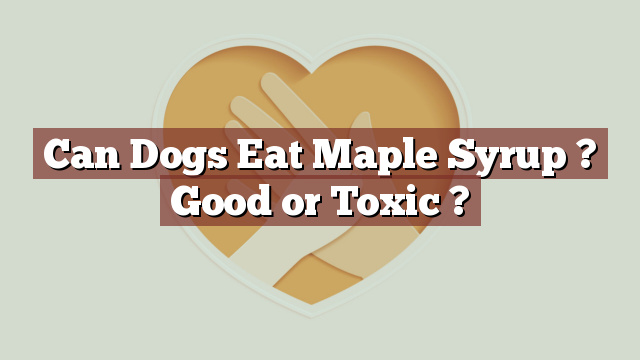Can Dogs Eat Maple Syrup? Good or Toxic?
As responsible pet owners, it is crucial to be aware of what foods are safe for our furry friends. We often find ourselves wondering, can dogs eat maple syrup? This article will provide you with the necessary information to make an informed decision about whether or not to share this sweet treat with your canine companion.
Nutritional Value of Maple Syrup: Vitamins, Minerals, and Sugar Content
Maple syrup is derived from the sap of maple trees, and its unique flavor makes it a popular choice for pancakes, waffles, and other dishes. From a nutritional standpoint, maple syrup contains small amounts of vitamins and minerals, including calcium, iron, zinc, and manganese. However, it is important to note that the sugar content in maple syrup is relatively high.
Can Dogs Eat Maple Syrup? Safety and Toxicity Explained
In short, dogs can eat maple syrup, but in moderation. While small quantities are generally safe, it is essential to understand the potential risks associated with feeding your dog this sweet treat. One of the primary concerns is the high sugar content. Dogs’ digestive systems are not designed to process large amounts of sugar, which can lead to obesity, dental issues, and even diabetes in the long run.
Additionally, some types of maple syrup may contain artificial sweeteners, such as xylitol, which is highly toxic to dogs. Xylitol can cause a rapid release of insulin in a dog’s body, leading to a dangerous drop in blood sugar levels. Therefore, it is crucial to check the ingredients list before sharing maple syrup with your furry friend.
Potential Risks and Benefits of Feeding Dogs Maple Syrup
Feeding your dog maple syrup can be risky if not done in moderation. The excessive sugar content can contribute to weight gain, tooth decay, and other health problems. Moreover, the consumption of artificial sweeteners like xylitol can be life-threatening for dogs.
On the other hand, there may be some benefits to offering your dog small amounts of maple syrup. It can serve as a tasty incentive during training sessions or be used to mask the taste of medication. However, it is important to remember that these benefits should be weighed against the potential risks.
What to Do if Your Dog Accidentally Consumes Maple Syrup
Accidents happen, and if your dog accidentally consumes maple syrup, it is important to take appropriate action. The first step is to assess the situation and determine the quantity ingested. If it was a small amount, there may not be immediate cause for concern. However, if your dog has ingested a significant amount or maple syrup containing xylitol, it is crucial to seek veterinary advice immediately.
Conclusion: Moderation and Consulting a Veterinarian is Key
In conclusion, while dogs can consume maple syrup in moderation, it is important to be mindful of the potential risks associated with its consumption. The high sugar content and possible inclusion of artificial sweeteners make it a treat that should be given sparingly, if at all. As always, consulting your veterinarian about your dog’s specific dietary needs is the best course of action when introducing new foods into their diet. Your vet can offer personalized advice based on your dog’s age, breed, and overall health to ensure their well-being remains a top priority.
Thank you for investing your time in exploring [page_title] on Can-Eat.org. Our goal is to provide readers like you with thorough and reliable information about various dietary topics. Each article, including [page_title], stems from diligent research and a passion for understanding the nuances of our food choices. We believe that knowledge is a vital step towards making informed and healthy decisions. However, while "[page_title]" sheds light on its specific topic, it's crucial to remember that everyone's body reacts differently to foods and dietary changes. What might be beneficial for one person could have different effects on another. Before you consider integrating suggestions or insights from "[page_title]" into your diet, it's always wise to consult with a nutritionist or healthcare professional. Their specialized knowledge ensures that you're making choices best suited to your individual health needs. As you navigate [page_title], be mindful of potential allergies, intolerances, or unique dietary requirements you may have. No singular article can capture the vast diversity of human health, and individualized guidance is invaluable. The content provided in [page_title] serves as a general guide. It is not, by any means, a substitute for personalized medical or nutritional advice. Your health should always be the top priority, and professional guidance is the best path forward. In your journey towards a balanced and nutritious lifestyle, we hope that [page_title] serves as a helpful stepping stone. Remember, informed decisions lead to healthier outcomes. Thank you for trusting Can-Eat.org. Continue exploring, learning, and prioritizing your health. Cheers to a well-informed and healthier future!

